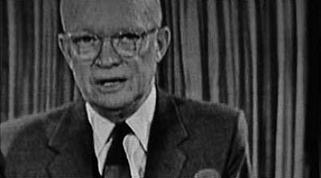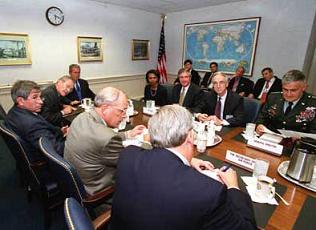

Documentary filmmaker Eugene Jarecki always knew what the term "military-industrial complex" meant, but he never knew where it came from. After some research, he discovered that the President Eisenhower coined the term in his farewell speech in 1961. This speech was an impassioned call for peace, especially emotional because it came from a celebrated war hero. Eisenhower posited that the United States and many companies involved in the production of arms realized that they could generate massive profits if the United States was in a constant state of war. More war meant more weapons, and more weapons meant more contracts. His prediction was eerily accurate, and one only wishes that Jarecki (The Trials of Henry Kissinger, The Opponent) made a more balanced film.
Like many documentary filmmakers today, Jarecki (whose brother made the excellent Capturing the Friedmans) is very much against the Bush administration. His views come across in Why We Fight, and there is nothing wrong with that. What is disappointing is that Jarecki relies on assumptions and finger pointing to get his point across. He fails to present a clear case backed up by facts. Jarecki interviews people who he knows will agree with him, and basically plays to an audience that will agree with him. People that agree with him will like the film, and people that disagree with him will not. Simple as that. He fails to realize that by presenting an airtight argument is better because it gives more credibility to a film. Look at The Corporation. Whether or not a viewer agrees, it is by far one of the most fascinating documentaries to emerge recently, because its filmmakers backed it up so thoroughly. While Why We Fight doesn't descend to Michael Moore-ish theatrics, it is easy to disregard it because it feels too biased.
It's especially bad given that the first half of Why We Fight is extremely compelling. Jarecki begins by tracing the development of the "military-industrial complex." American troops are sent across the world, ensuring a steady flow of money into the coffers of the armament industry. The true reason is greed, but the reason presented is freedom. America claims it is spreading freedom and democracy, and this is the answer given when Jarecki and his crew interview ordinary people around the country. Jarecki believes that this is a superficial reason with ominous undertones. He also tells the story of the two Stealth bomber pilots who dropped the initial bombs on Iraq, and follows them over the course of Why We Fight as they make their way to Iraq. Wilton Setzker, a retired New York City police officer, offers a very personal view of the War. His son died in 9/11, and he managed to get the military to write his son's name on a bomb dropped over Iraq, only to discover later that Iraq and 9/11 were not connected.
And this is where the documentary begins to stray. Jarecki posits that a third entity, the think tanks, have developed an incestuous relationship with the military-industrial complex. In particular, the neo-conservatives, with their imperialistic views of American power. They believe that with the fall of the Soviet Empire, America should be the only superpower. Jarecki traces the careers of people like Donald Rumsfeld, Dick Cheney, and Paul Wolfowitz, and how they are all now in positions of power, and able to implement their ideas. The invasion of Iraq was always a sham, meant to further the American empire. Uh, yeah, a bit over the top. Jarecki does interview people on both sides of the debate. The most effective person is Lt. Col. Karen Kwiatkowski (Uncovered), who retired from the Pentagon after she felt that people without the proper information were making decisions about war. Why We Fight needs more people like Kwiatkowski and Senator John McCain, who argue calmly and coherently about their beliefs. They give the most convincing arguments. Unfortunately, people like Gore Vidal and Dan Rather show up briefly but make such strong one-sided statements that it drowns out Setzker and Kwiatkowski.